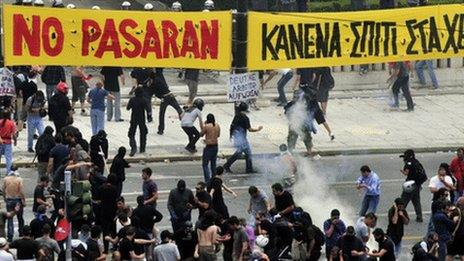Debt-laden Greece mired in anger and humiliation
- Published
- comments

As thousands protested outside parliament Greece was paralysed by a general strike on Wednesday
The Greeks are being humiliated. Their frequent protests have an air of futility about them. Their fate is being decided elsewhere, by unelected officials from the EU or the IMF.
Comments at today's protests in Greece oscillate between rage and despair. One demonstrator spoke of a country "being torn to pieces".
The IMF and EU send in accountants and economists who occupy space in the finance ministry. When it comes to selling off state assets - intended to raise 50bn euros (£44bn; $72bn) - there is debate as to whether this should be overseen by a non-Greek body. It would have been the final humbling.
There were suggestions, too, that foreigners should run Greek tax collection. Those ideas may have been sidelined but the resentment has not gone away.
Some say that Greece has become a protectorate of the EU. Certainly the intervention from outside in Greece's internal affairs is unprecedented.
The Greek Prime Minister, George Papandreou, flies off to meetings to learn the terms of his surrender. He had promised no more cuts, but in return for Greek Bail-out II , externalhe will have to take the axe to public sector jobs.
Further spending cuts of 6.4bn euros - that was the condition set by the EU and IMF in exchange for more aid.
State assets are being sold off. The crowds shout "we won't sell!" - but that's precisely what the government has been told to do.
Partners losing patience
Many of the details of the next round of cuts are yet to be revealed. If Greece fails to meet the IMF terms then the Dutch, Germans and Finns might refuse a second bail-out.
Mr Papandreou says "we are in the middle of an ongoing battle. We will not surrender."
But increasingly the people are not with him. The polls indicate a steady decline in his support. Today the protesters wanted to stop MPs reaching the parliament building.
Perhaps in jest, but stinging nonetheless, German and European officials have spoken of Greece selling off its islands.
The pain might have been endurable if it had worked. A year after Greek Bail-out I, external (worth 110bn euros) Greece has seen industrial production slump by 11%. Unemployment is up to 16%. The number of Greeks out of work is up 40% from a year earlier. And the debt mountain has ballooned - heading towards 153% of GDP.
And here's the worst aspect of all of this. The Greeks are about to get another tranche of money. That will only add to the debt. And it is hard to find a serious economist who doesn't believe that the strategy is to kick the can down the road.
Default looms. Maybe not this year, but almost certainly in 2015. For European officials the hope is that by then the banks will be more resilient to take a hit. Certainly well-respected German economists don't expect to get their money back.
But in the meantime there is a human cost. The social services organisation Klimaka runs a food kitchen that feeds 3,000 people a day - many are now from the middle classes. There are 30 calls a day to its suicide line. Some, like former Prime Minister Stefanos Manos, warn of a social explosion.
And if the Greek people simply refuse to accept further austerity then default looms.
Pressure on Papandreou
How did we get here? Greece was seduced by the low interest rates that followed joining the euro. It took on too much debt. When the crash came it found itself with debts it couldn't handle. The euro has proved a disaster for Greece.
There are plenty who point a finger at Greece itself. It faked its own accounts. Wide-scale tax evasion. A rigid job market. A bloated public sector. Early retirement. There is some truth in all of those accusations, but what ordinary Greeks can't see is how the present policies offer a way out.
If it looks unlikely that George Papandreou will get his austerity measures through parliament then he might go for early elections or even gamble on a referendum.
It is still possible that there is a silent majority who support spending cuts and state privatisations. But Greece is a wounded country and popular opinion cannot be counted on.
- Published15 June 2011

- Published21 May 2011
